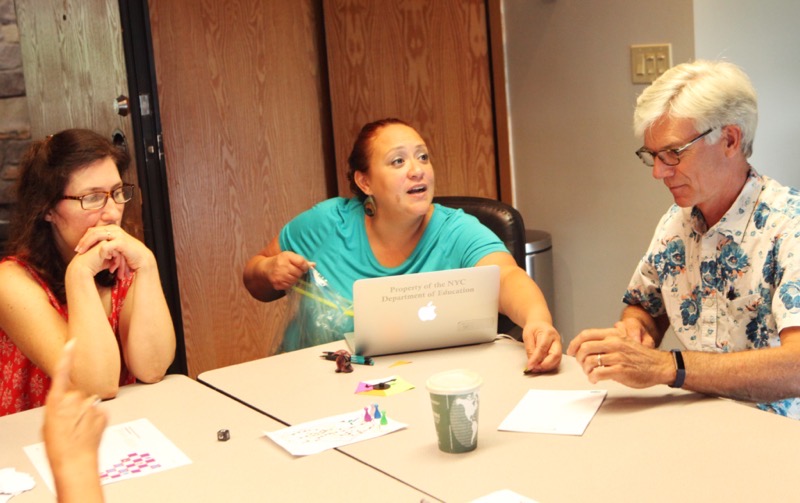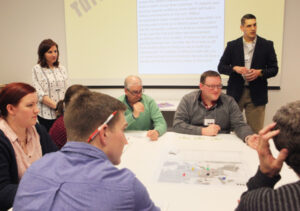Teaching History in the 21st Century
WW HISTORYQUEST FELLOWS ON TEACHING HISTORY FOR THE 21ST CENTURY
Share

In the era of smartphones and one-to-one laptops in schools, students have incredible access to information. Says Scott Kallens HQ ‘15, “if I ask my students a trivia-based question, they can find that answer inside of five seconds.”
“But do they know what to do with that answer? Do they know why that answer is the answer? Can they do anything with that information?” asks Mr. Kallens, a social studies teacher at Hillsborough High School in New Jersey. “That’s our job.”
Kelli Kallens HQ ‘15 sees history as a way to teach vitally important skills. “History is a wonderful subject on its own, but it does so much more than explain where we have been,” says the Montgomery Upper Middle School 7th- and 8th-grade social studies teacher (she is married to Scott Kallens). “We live in a very interconnected and interdependent world in which communication, collaboration, and empathy skills are vital. Students must be able to identify and apply the larger concepts, and be able to synthesize acquired knowledge for critical thinking and problem solving. History class provides an environment to learn and practice these skills.”
“Building that social-emotional part of that child is really important,” says Maritza Rivera HQ ‘18, who is using the history games designed during her HistoryQuest Fellowship in her 8th-grade social studies class at Jonas Bronck Academy in the Bronx. With history presented as a game, students “have to work with others—working as a team, collaborating together’. It’s okay to disagree, but why do some people say yes, while others say no? This approach allows us to really go back and hash those ideas out.”
In these ways, the HistoryQuest Fellows say, game-based learning in history enables students to connect better with the material. A text about a founding father might not, by itself, speak to a 21st-century high-schooler, but through the WW HistoryQuest Fellowship, teachers are creating opportunities for students to step into the founding fathers’ shoes and explore some of the decisions they had to make.

“If we can place them in context and connect on an emotional level with the kinds of things that those people were dealing with at the time, my students are going to come out of that having a better understanding,” says Mr. Kallens. “They get a better appreciation for the history that they’re studying and then, hopefully, from there begin to think more critically about the world that they live in.”
Giving students this ability to look at the world around them through an informed lens feels like an increasingly pressing responsibility to Ms. Kallens.
“It’s important for students to start to say, ‘You know, maybe what I’m hearing isn’t the whole story.’” She hopes her students will ask questions: “‘Maybe I need to go a little bit further and educate myself more. Maybe there’s more I can do. Or maybe this is an opportunity to step up and to make change.’”
“My goal is for them to be able to be active citizens and participatory members of society and to make thoughtful conscientious well-rounded decisions as citizens,” says Mr. Kallens
Ms. Rivera is finding that game-based learning helps her reach more students.
“I’m looking at my lessons now and [HistoryQuest] has given me that opening where I can really make great modifications,” she says “I can see where a certain kid is struggling and ask why. Other kids can shine if you’re giving them a chance to do certain things they’re good at.”
As the game-based model has given these teachers’ classrooms new dimensions, it has also spurred opportunities and discussions in their wider school communities.
“Let’s make a game for this topic has turned into, ‘What are we really trying to get at? What is the big idea that we want our students to walk away with?’” explains Ms. Kallens. “Then we walk backward and make a game. But those are important conversations to have, and I think that’s what I always felt was lacking from my profession, those big conversations. Now those are happening on a daily basis.”
“I still wake up excited for the next day, and I’m always trying to find new ways to innovate and improve my craft,” says Scott Kallens. “Hopefully I can deliver some of that care and that passion and that interest to my students.”
Stay Engaged
Get More News
Join our mailing list to get more news like this to your mailbox.
Support Our Work
Help us invest in the talent, ideas, and networks that will develop young people as effective, lifelong citizens.
Ways to Support Us